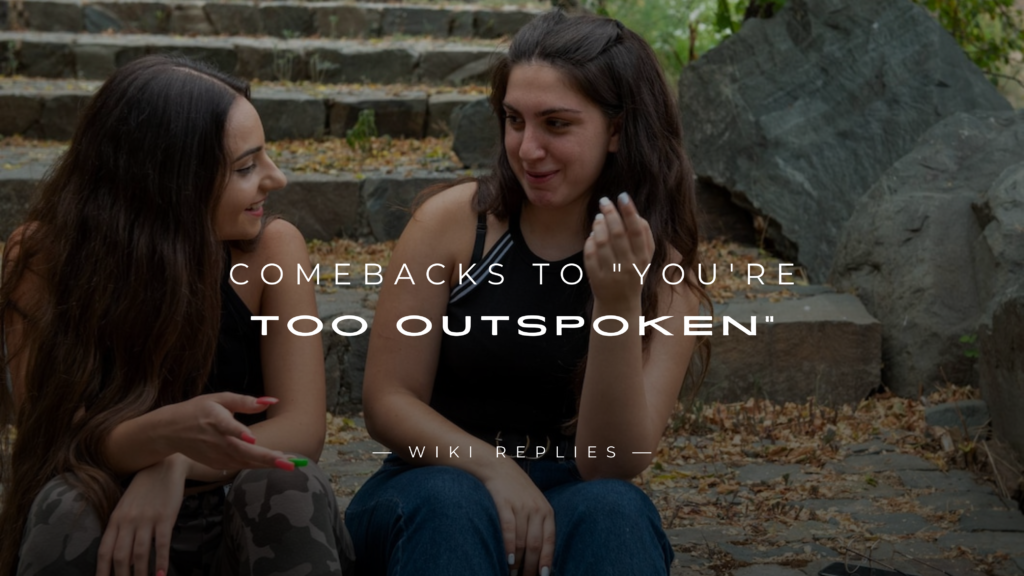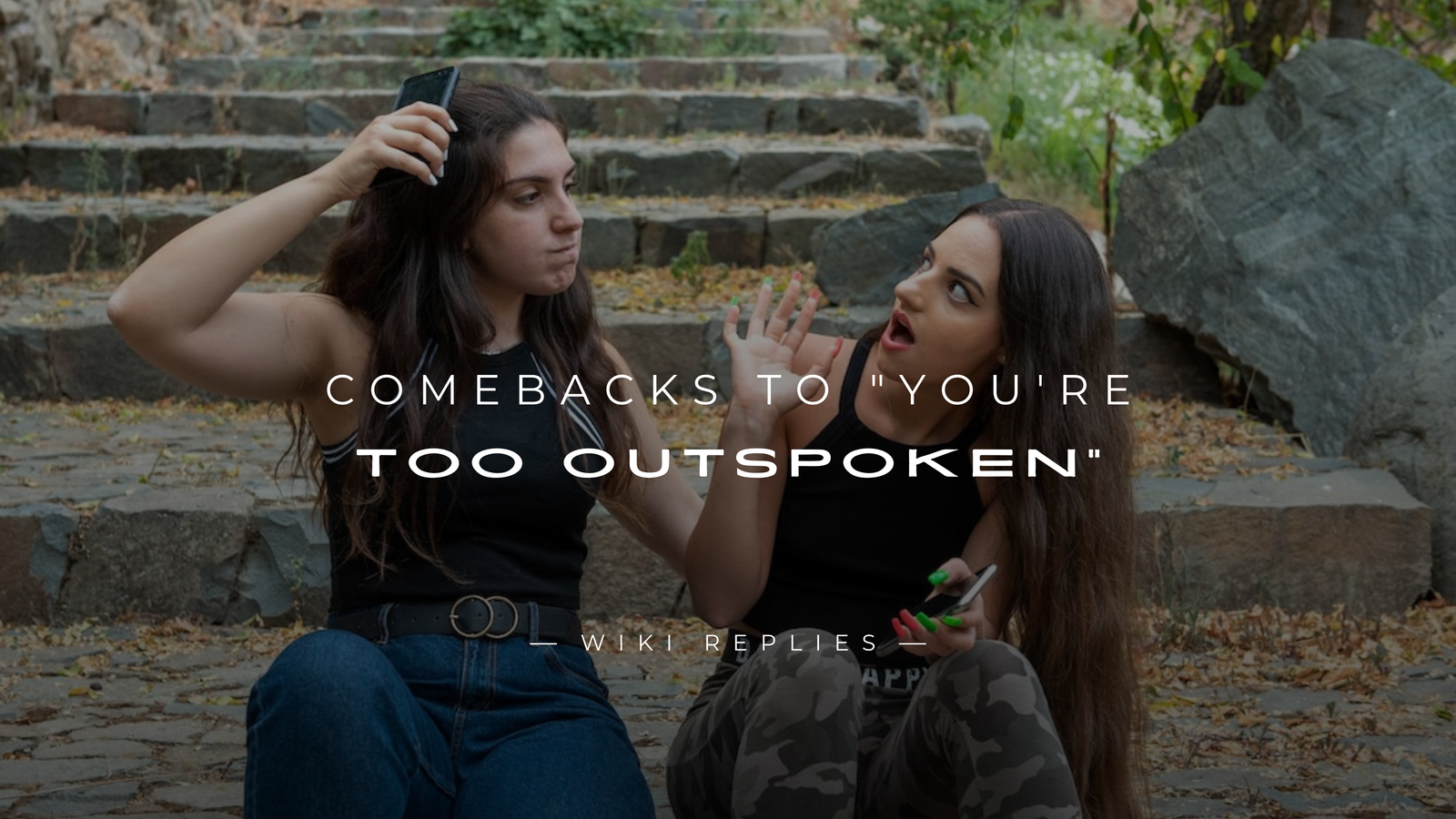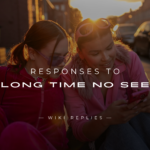Has someone ever looked at you and said, “You’re too outspoken,” like it was a flaw instead of a compliment? It’s a phrase that can sting, especially if you’re someone who values honesty and clear communication. Being called outspoken often carries a negative tone, as if speaking your truth is something to be ashamed of. But here’s the truth no one tells you often enough: being outspoken is powerful. It’s brave. It’s necessary.
This article is here to help you understand why people say that phrase, what they might really mean, and how to confidently respond with clever, calm, and empowering comebacks. Whether you’re at work, in a social setting, or even dealing with family, you deserve to speak up without being shamed for it. Let’s dive into the mindset, the strategies, and the exact words you can use when someone tries to put you in a box with those four words: “You’re too outspoken.”

220+ Comebacks to “You’re Too Outspoken”
Confident
- I don’t shrink myself to fit someone else’s comfort zone.
- Speaking up is part of knowing my worth.
- I’m not afraid of being heard.
- I own what I say — and how I say it.
- I’ve worked hard to find my voice. I’m not losing it now.
- I’d rather stand tall with opinions than stay silent with regrets.
- Being outspoken means I’m not hiding. That’s strength.
- Silence never served me — confidence did.
- I’d rather be too bold than too bland.
- My voice wasn’t made to be dimmed.
Witty
- I guess someone has to liven up the conversation.
- Don’t worry — I talk this much for free.
- I’m not outspoken. I’m just on premium volume.
- Sorry, did I interrupt your regularly scheduled silence?
- I prefer the term “enthusiastically expressive.”
- I’d stop, but then we’d both be bored.
- I have two modes — quiet or quotable.
- At least you always know where I stand.
- It’s not loud if it’s true.
- I wasn’t aware honesty came with a volume limit.
Sarcastic
- Oh no, how awful — a woman with opinions.
- I’ll try to tone down my personality just for you.
- So sorry for not whispering my existence.
- Yes, I’ll send my thoughts to you in Morse code next time.
- Didn’t realize speaking words was such a crime.
- I forgot — only echoes are allowed here.
- You’re right. I should probably come with a mute button.
- I’ll work on being invisible just to match your energy.
- Wow, my bad. I assumed we were in a conversation.
- I’m just trying to meet the outspoken quota for the day.
Humorous
- I’ve got opinions and zero chill — a dangerous combo.
- I was born loud. I just grew into the confidence.
- I tried being quiet once — almost choked.
- This is me on level 3. You don’t want to hear level 10.
- It’s not outspoken. It’s just high-definition honesty.
- I’m not loud — the truth just echoes.
- If you think I’m outspoken, wait till I get a mic.
- The volume’s fine. You just weren’t ready.
- I speak fluent “say it like it is.”
- I’m not dramatic. I’m just animated.
Empowered/Feminist
- If I were a man, you’d call it leadership.
- Being outspoken doesn’t make me difficult — it makes me powerful.
- The world needs more women who don’t back down.
- My voice isn’t loud — it’s necessary.
- This is what not being silenced looks like.
- Generations before me fought for this voice — I’m using it.
- I’m not outspoken. I’m unapologetically present.
- It’s not my tone — it’s your discomfort with assertive women.
- I don’t owe anyone quiet to earn respect.
- Speaking up is how change begins — and I’m here for it.
Calm and Rational
- I’m simply not afraid to express my thoughts clearly.
- Being direct doesn’t mean I’m being rude.
- I prefer open communication over silent resentment.
- It’s important to speak honestly, even when it’s uncomfortable.
- I’d rather say too much than leave things unclear.
- I believe thoughtful expression is a strength.
- Listening doesn’t mean silencing my own voice.
- I don’t mean to offend — just to be understood.
- Assertiveness is not aggression.
- Everyone deserves to be heard, including me.
Intellectual
- History wasn’t shaped by the silent.
- Clarity of thought deserves clarity of voice.
- If a well-formed opinion is too much, maybe the issue isn’t volume.
- Engagement and expression go hand in hand.
- An informed voice should never be muted.
- Speaking up reflects critical thinking, not arrogance.
- Minds that question are often labeled “too loud.”
- I value discourse — not just agreement.
- Truth tends to stand out, not stay quiet.
- I’ve read enough to know silence doesn’t equal wisdom.
Boundary-Setting
- I won’t apologize for not shrinking myself.
- Your comfort doesn’t dictate my self-expression.
- I’m not here to make myself smaller for others.
- My voice isn’t a problem — your reaction to it is.
- If honesty feels loud, maybe it’s time to listen.
- I’m allowed to speak without being labeled.
- I won’t be silenced to keep the peace.
- I have every right to take up space.
- I set boundaries with my words, not with silence.
- Respect goes both ways — and that includes listening.
Self-Deprecating
- I tried subtle. It got lost in translation.
- Honestly, I surprise myself sometimes too.
- I don’t even come with a mute button.
- I’ve been trying to filter myself — it’s a work in progress.
- It’s either outspoken or awkward silence with me.
- I have thoughts and no chill — sorry in advance.
- Believe it or not, this is my inside voice.
- I keep telling myself to shut up, but I rarely listen.
- I wasn’t built for background noise.
- I get dramatic when I’m passionate — and I’m passionate a lot.
Deflective Humor
- Who, me? I’m just narrating life out loud.
- I prefer to think of it as passionate storytelling.
- I’m just adding sound effects to the silence.
- If I don’t say it, my eyebrows will.
- I’m not loud — I’m surround sound.
- It’s not outspoken, it’s just expressive jazz hands but with words.
- I’m doing a TED Talk, they just haven’t invited me yet.
- I’m practicing for my memoir’s audiobook.
- Someone’s gotta keep the conversation interesting.
- Think of me as closed-captioning for unspoken truths.
Stoic
- I say what I mean. Nothing more, nothing less.
- Speaking my mind keeps things simple.
- I don’t speak to be loud. I speak to be clear.
- Silence isn’t always the wise choice.
- I’d rather be direct than misunderstood.
- My voice isn’t raised. It’s grounded.
- I’m not here to impress. I’m here to express.
- I’ve learned not to waste words, so when I speak, I mean it.
- I don’t shout. I state.
- I speak because I choose truth over comfort.
Confessional
- I used to stay quiet, but it never helped me grow.
- I held my tongue for too long. Now I don’t.
- I’ve been silenced before. I won’t let it happen again.
- I learned the hard way that silence doesn’t protect you.
- I’m still figuring it out, but this voice took time to build.
- I used to edit myself for everyone’s comfort. I stopped.
- I’m not trying to be loud. I’m just finally being honest.
- This version of me comes from years of not speaking up.
- I know I can be intense, but I’ve earned the right to be heard.
- I never liked conflict, but I dislike regret even more.
Turn-the-Tables
- Or maybe you’re just not used to people being real.
- Funny, I was thinking you’re too quiet.
- Maybe the issue isn’t me being outspoken, but you being uncomfortable with truth.
- Why does assertive bother you more than passive?
- I wonder if you’d say the same if you agreed with me.
- Or maybe I’m just the first to say what others are thinking.
- That sounds like a you problem, not a me problem.
- You call it outspoken. I call it authentic.
- Is it outspoken, or just not sugar-coated?
- Maybe it’s not that I’m too loud, but that you’re not used to being challenged.
Proud
- I’m proud of how far I’ve come — and I’ll never stay silent again.
- My voice is strong because I worked for it.
- I don’t hide who I am anymore.
- I speak up because I value myself.
- I’ve got a lot to say and even more to stand for.
- This isn’t too much. This is me, fully.
- I earned this voice. I use it with pride.
- I don’t apologize for being fully present.
- I’m not everyone’s cup of tea — and that’s the point.
- I’d rather be too much than never enough.
Playful
- Outspoken? I prefer “vocally fabulous.”
- I came with extra opinions — it’s a bonus pack.
- You should see me when I try to stay quiet. It’s tragic.
- My voice has a personality of its own.
- I’d tone it down, but where’s the fun in that?
- Being quiet is so last season.
- I talk like I live — fully and with flair.
- I’m basically a walking commentary.
- Think of me as the soundtrack to real life.
- I came here to talk, and I took that very seriously.
Empowering Others
- I speak up so others know they can too.
- If I stay quiet, what message does that send?
- I want people to see that it’s okay to take up space.
- Being vocal is part of leading by example.
- If we don’t speak, who will?
- I’ve been quiet before — I know how lonely that feels.
- Maybe someone needs to hear me so they feel seen.
- My words are loud because they carry more than just my story.
- I use my voice to make space, not just take space.
- I’d rather risk being called outspoken than let someone feel invisible.
Chill/Detached
- I just say what I think. No big deal.
- It’s cool if you don’t agree — I’m just being me.
- I’m not trying to prove anything. I’m just not quiet.
- I’m not here to argue. I’m just not silent.
- I don’t take it personally if you don’t get it.
- Honestly, I forget people think this is a big deal.
- I speak up. That’s just how I operate.
- No offense taken — I’ve heard worse.
- I say it straight because it saves time.
- It’s just how I communicate. Nothing more to it.
Unbothered
- Noted. Anyway, moving on.
- That’s cool. I’ll keep being me.
- Doesn’t really faze me, but thanks for sharing.
- Sure. And?
- You’re allowed to think that. I’m still going to speak.
- Happens. I’ve heard worse.
- If that’s the worst thing someone says about me, I’m doing alright.
- That’s your opinion. I’ve got mine.
- I’m not here to be quiet for someone else’s comfort.
- I sleep fine either way.
Reframing
- I prefer the word expressive.
- Outspoken sounds negative. I call it clear and direct.
- I see it as being honest, not loud.
- I’d say I’m engaged, not overbearing.
- It’s not too outspoken. It’s just not sugar-coated.
- To me, it’s assertive communication.
- I speak with intention, not aggression.
- I value clarity. That’s all it is.
- I don’t see that as a flaw. I see it as a strength.
- You call it outspoken. I call it showing up fully.
Educator Mode
- There’s a difference between being outspoken and being disrespectful.
- Assertiveness is a communication skill, not a flaw.
- Many cultures see speaking up as a form of leadership.
- Being expressive doesn’t mean lacking self-control.
- Strong voices often face strong resistance.
- I believe in direct communication. It reduces confusion.
- There’s value in saying things out loud that others won’t.
- Women and marginalized folks often get labeled this way unfairly.
- Open dialogue means hearing all voices, not just agreeable ones.
- We grow when we listen — but also when we speak.
Deadpan
- Cool story.
- Imagine how quiet the world would be if I cared.
- Noted for the list of things I won’t change.
- I’ll try to whisper my next opinion.
- Wow. Thanks for the unsolicited feedback.
- Didn’t ask, but thanks.
- Groundbreaking observation.
- I guess my vocal cords missed the memo.
- I’ll send that complaint to customer support.
- Shocking. A human with a voice.
Philosophical
- A voice unused is a life half-lived.
- Silence is safe, but change isn’t born from safety.
- I speak because stillness never moved the world.
- The truth, when spoken, often sounds too loud.
- To be silent is to consent. I choose otherwise.
- A free mind eventually finds its voice.
- We weren’t given voices just to stay quiet.
- Discomfort isn’t a sign to stop — it’s often a sign to continue.
- The loudest thoughts are usually the ones kept inside. I just let mine out.
- If thought is freedom, then speech is its expression.
What Does “You’re Too Outspoken” Really Mean?
- It’s Not Always About You
When someone says “You’re too outspoken,” it’s rarely about you being genuinely inappropriate. Most of the time, it reflects their discomfort. You might have said something that challenged their perspective, exposed a truth they didn’t want to face, or simply didn’t match their idea of how people should communicate. That phrase often comes from a place of discomfort, not logic.
- The Double Standard in Communication
Let’s be real. People often label others as “too outspoken” based on biases. Men are praised for being assertive, while women are often labeled aggressive. The same goes for cultural differences. In some communities, being direct is encouraged. In others, it’s considered rude. This phrase is rooted in societal expectations and norms that often need to be challenged, not followed.
- The Fear Behind the Words
Sometimes, people fear what they can’t control. Your confidence may intimidate them. Your honesty might put them on the spot. Your willingness to say what others only think? That can shake things up. Instead of engaging with the content of your words, they attack the delivery. That’s their problem, not yours.
The Importance of Context
- Who Said It Matters
Think about where and when you heard “You’re too outspoken.” Was it in a professional setting? A heated debate? A casual conversation? And more importantly, who said it? A boss, a peer, a friend, or a stranger? The intent behind the phrase can change everything. If it’s coming from someone you respect and who respects you, it might be constructive feedback. But if it’s someone trying to silence or diminish you, that’s not criticism, that’s control.
- When Speaking Up Is Necessary
There are moments when staying silent does more harm than good. In a meeting where no one is pointing out a critical flaw in a project, your voice could save the team. In a relationship, speaking your truth might bring healing or necessary boundaries. Being outspoken doesn’t mean you always talk; it means you speak up when it counts.
Smart Comebacks to “You’re Too Outspoken”
Confident and Classy Responses
Here are some go-to responses when you want to stay calm, collected, and classy:
- “I believe in clear communication. That’s just how I operate.”
- “Outspoken? I’d call it being honest.”
- “Thank you for noticing I’m not afraid to use my voice.”
These kinds of responses don’t start a fight. They let the other person know that you heard them but you’re not going to shrink yourself for their comfort.
Funny Comebacks That Lighten the Mood
Sometimes humor is the best armor. Try something like:
- “Too outspoken? Imagine if I said what I was really thinking!”
- “I tried staying quiet once. It was awful. Zero stars. Would not recommend.”
- “Being outspoken is cheaper than therapy, and way more fun.”
These lighten the mood, diffuse tension, and show that you’re confident enough to laugh at yourself while still standing your ground.
Thought-Provoking Responses
If you want to challenge the person to think more deeply without being confrontational, go with something like:
- “Is it the content of what I said that bothered you, or how I said it?”
- “Why do you think being outspoken is a bad thing?”
- “Would you prefer I say nothing at all?”
These responses encourage reflection and open the door for real conversation.
Using Emotional Intelligence
- Stay Calm and Grounded
You don’t need to match their energy. If someone says you’re too outspoken with a snarky tone or judgmental attitude, the best power move is to stay cool. Take a breath. Maintain eye contact. Speak clearly. People often expect a defensive reaction, but when you respond with calm strength, it surprises them and shifts the power dynamic.
- Ask Clarifying Questions
You can also respond with curiosity:
- “Can you help me understand what about my comment felt too much?”
- “What would have felt like a more appropriate way to say that?”
By asking questions, you’re not just defending yourself. You’re raising the conversation to a more thoughtful level.
When Silence Speaks Volumes
- Not Every Comment Needs a Comeback
Sometimes the best response is no response. If someone consistently labels you as “too outspoken,” they might be trying to provoke you or diminish your confidence. Let your silence say, “I’m not even going to waste my energy on that.” Walk away, smile, and carry on with your life like the confident, outspoken force you are.
- Let Your Actions Speak
Let your results talk. Let your integrity show. Keep doing great work, being honest, standing up for what you believe in. People might try to label you, but over time, your consistency and character will speak louder than any words ever could.
Being Outspoken Is a Strength
- The World Needs Bold Voices
Think about the people who’ve changed the world. They weren’t quiet. They didn’t blend in. They made noise, challenged the status quo, and kept speaking when others told them to stop. Martin Luther King Jr., Malala Yousafzai, Oprah Winfrey, Greta Thunberg, and so many others were all told they were too outspoken at some point. And yet, their voices moved mountains.
- You Don’t Have to Apologize for Your Voice
Your voice is your power. Don’t dull it for anyone. You’re not here to make everyone comfortable. You’re here to be real, to be kind, and to be true to yourself. And if that’s “too outspoken” for some people, so be it.
Avoid These Mistakes in Comebacks
- Don’t Get Defensive
Getting defensive can make you seem unsure of yourself. Even if the comment stings, keep your composure. The goal is not to prove them wrong but to stay rooted in your truth.
- Don’t Insult or Attack
Avoid turning the comeback into a fight. Sarcasm and personal jabs might feel good in the moment, but they rarely help your case. Stay classy. Stay focused.
- Don’t Over-Explain Yourself
You don’t owe anyone a long explanation for why you’re outspoken. A simple, direct response is often the most powerful.
Embrace Your Boldness
- Celebrate Your Voice
Start seeing your voice as a gift, not a problem. Celebrate your boldness. The world already has enough people who stay silent when they shouldn’t. Your voice might be the one thing that sparks change, inspires someone, or prevents harm.
- Help Others Use Their Voice Too
When you’re confident enough to speak up, you give others permission to do the same. Your example could empower someone who’s been told their whole life to stay quiet. That’s the power of being outspoken.
Conclusion
Being outspoken isn’t a flaw — it’s a strength. Whether you’re facing judgment, sarcasm, or subtle digs, having the right comeback empowers you to stay confident and true to yourself. These 220+ comebacks are here to remind you that speaking your mind isn’t just okay — it’s admirable. If you’ve ever also been labeled a “know-it-all,” don’t miss our collection of 220+ Best Comebacks to “You’re a Know It All” for even more ways to respond with confidence and class.
FAQs
Q. What’s a professional way to respond to “You’re too outspoken” at work?
You can say, “I aim for open communication and honesty, especially when it helps the team grow. If there’s a better way to phrase things, I’m open to feedback.”
Q. How do I know if I’m being outspoken or just rude?
It comes down to intent and delivery. If you’re honest but respectful, you’re outspoken. If you’re blunt and disrespectful, it might come off as rude. Be mindful, not silent.
Q. Can being outspoken hurt relationships?
Only if it’s used without empathy. If you balance honesty with kindness, being outspoken can actually build stronger, healthier relationships based on real communication.
Q. Is it possible to tone it down without losing myself?
Yes. You can be tactful without being fake. It’s not about changing who you are, but learning how to adapt your delivery to the situation.
Q. How can I teach my kids to be outspoken in a healthy way?
Model it. Show them how to speak their truth respectfully, how to stand up for what’s right, and how to listen just as much as they talk. Confidence is taught through example.










